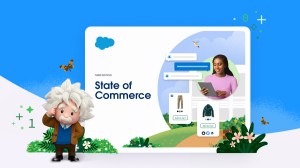New research shows that a majority of consumer goods purchases prefer to use online retailers when purchasing by price, but when pricing is not a factor, a majority still prefers to shop in brick-and-mortar stores
Millennials are five times more likely to rely on social media interactions when researching a product or before buying than Baby Boomers
Forty-one percent of Millennials would be willing to share personal info with a brand in exchange for more personalized service and discounts, compared to only 22% of Baby Boomers
SAN FRANCISCO, June 13, 2016 — Salesforce [NYSE: CRM], the Customer Success Platform and world’s #1 CRM company, today released its “2016 Connected Consumer Goods Report,” surveying more than 2,000 adults ages 18 and older in the United States to better understand their preferences on how they research, buy and communicate with consumer goods brands.
Changes in customer expectations across all generations are forcing consumer goods brands and retailers to move beyond simply selling products to offering compelling and personalized experiences through direct engagement with consumers. Technologies, such as social channels, mobile apps, online ads and comparison websites, are adding more opportunities and complexity in the way consumer goods companies engage with their customers. The Salesforce “2016 Connected Consumer Goods Report” found that brands that are able to understand their customers and connect and engage with them in more personalized ways are setting themselves up for success.
The study was conducted online by Harris Poll on behalf of Salesforce from May 9-11, 2016. To download the Salesforce “2016 Connected Consumer Goods Report,” click here: https://www.salesforce.com/assets/pdf/industries/connected-consumer-goods.pdf
Key Report Findings
? Despite ease-of-use and lower prices when online shopping, consumers prefer shopping overall in brick-and-mortar stores.
? A majority of consumer goods purchasers (55%) say they find the best prices when shopping for a product at an online-only retailer.
? But when it comes to customer service, 53% say that they have the best experience at a brick-and mortar store, compared with just 22% who say they have the best shopping experience at an online-only retailer.
? There is a generation gap, as 63% of Baby Boomers would rather purchase a product in a store if prices were the same, compared to just 40% of Millennials.
? Consumer goods companies need to understand generational gaps when determining optimal marketing channels.
? Millennials are five times more likely to rely on social media interactions when researching a brand (25%) than their Baby Boomer (5%) counterparts.
? Sixty-nine percent of adults who have purchased a consumer good in the past 12 months use online product reviews to research a product before buying.
? Forty-five percent of consumer goods purchasers have a negative reaction when seeing an online advertisement or social media promotion of a brand that is related to something they just searched for online, primarily because it’s invasive (61%), it’s annoying or interrupts what they are trying to do (57%), or they don’t want their feeds filled with advertisements (56%).
? That said, brands and retailers who place ads on websites and social channels would be best served targeting millennials, as only 38% of these younger consumer goods purchasers have a negative reaction to these online ads.
? Millennials lead the way when it comes to brand loyalty.
? Millennials are more likely (44% to 26%) to be members of brand loyalty programs than Baby Boomers. Millennials are also more likely to publicly praise or complain about a brand (49% and 33%, respectively) than Baby Boomers (32% and 22%, respectively).
? Younger consumer goods purchasers prefer that brands understand their personal preferences based on previous purchase history compared to older generations. Sixty-five percent of Millennials would like brands to understand their personal preferences from shopping history compared to 48% of Baby Boomers.
? Forty-one percent of Millennials would be willing to share personal info with a brand in exchange for more personalized service and discounts, compared to only 22% of Baby Boomers.
Comment on the News
? “A significant number of traditional consumer goods companies believe that the moment of sale is the culmination of the relationship with the customer. That’s a short-sighted approach in today’s customer-first economy,” said Cindy Bolt, SVP, Salesforce Industries, Manufacturing and Consumer Goods. “With everyone and everything connected, companies that harness technology to move beyond the sale, deliver a seamless experience and build stronger relationships will be the ones that not only succeed, but also foster lifelong customers as well.”
Additional Resources
? Download a full copy of the report from the Salesforce Consumer Goods Team at: https://www.salesforce.com/assets/pdf/industries/connected-consumer-goods.pdf
? Like Salesforce on Facebook at http://www.facebook.com/salesforce
? Follow @salesforce on Twitter
Methodology
This survey was conducted online within the United States by Harris Poll on behalf of Salesforce from May 9-11, 2016 among 2,095 adults, ages 18 and older (1,988 purchased consumer goods in the past 12 months). This online survey is not based on a probability sample and therefore no estimate of theoretical sampling error can be calculated. For complete survey methodology, including weighting variables, please contact Joel Steinfeld. To download the Salesforce “2016 Connected Consumer Goods Report,” click here: https://www.salesforce.com/assets/pdf/industries/connected-consumer-goods.pdf.
Salesforce, Salesforce1 and others are among the trademarks of salesforce.com, inc. Other names and brands may be claimed as the property of others." © 2015 salesforce.com. All rights reserved.
# # #
About Salesforce
Salesforce is the #1 AI CRM, empowering companies to connect with their customers in a whole new way through the power of CRM + AI + Data + Trust on one unified platform: Einstein 1. For more information visit: www.salesforce.com.
Any unreleased services or features referenced in this or other press releases or public statements are not currently available and may not be delivered on time or at all. Customers who purchase Salesforce applications should make their purchase decisions based upon features that are currently available. Salesforce has headquarters in San Francisco, with offices in Europe and Asia, and trades on the New York Stock Exchange under the ticker symbol "CRM." For more information please visit https://www.salesforce.com, or call 1-800-NO-SOFTWARE.











